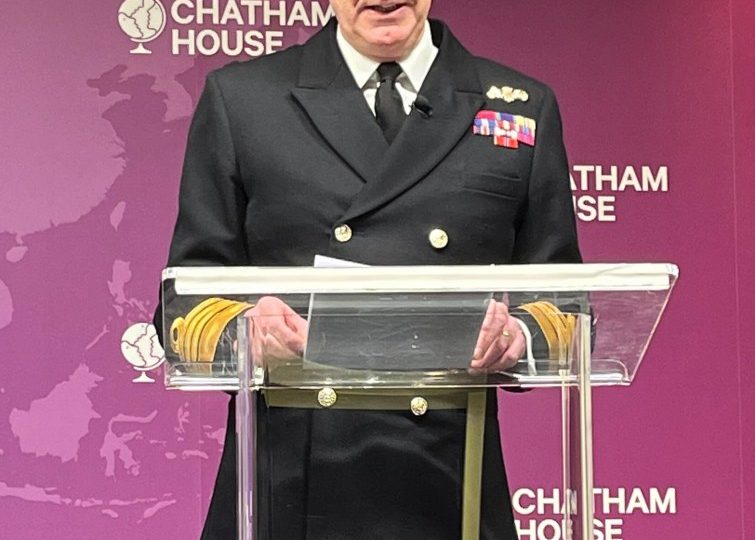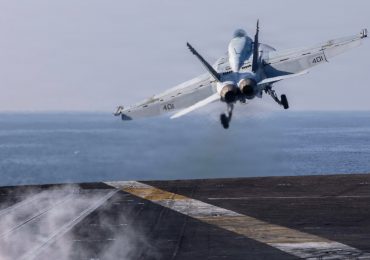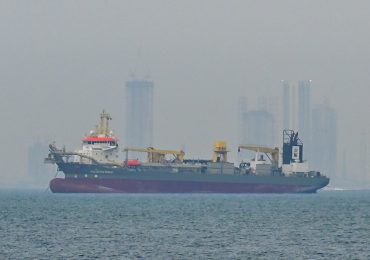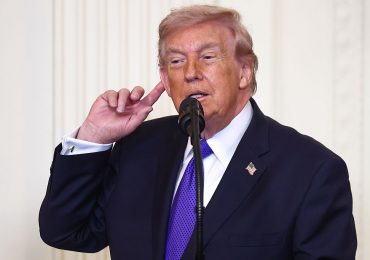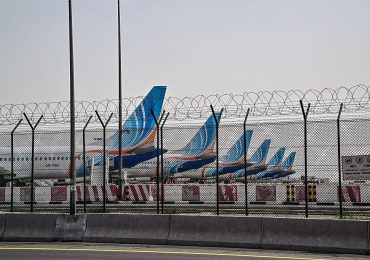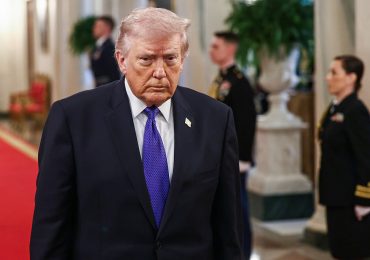BRITAIN’S Armed Forces chief Tony Radakin said today that the world is not on the cusp of World War Three despite tensions with Russia.
He claimed that the despot tyrant is fully aware Nato would crush him if he tried to invade.
Admiral Tony Radakin speaks at the Chatham House Security and Defence conference on TuesdayThe Sun
GettyA Leopard 2 main battle tank drives past Albanian and British vehicles during a Nato military exercise on Monday[/caption]
GettyA soldier of the United Kingdom’s 2nd Battalion Royal Anglian infantry unit storms an enemy position in a simulated attack[/caption]
“We are not on the cusp of war with Russia. We are not about to be invaded,” Radakin told security experts at the annual Chatham House Security and Defence conference.
He reassured Brits that despite Russia’s brutal two years of war in Ukraine, no military officials in the UK are talking about conscription for everyday civilians.
“Britain is safe. We are safe because we are part of Nato, the world’s largest and strongest alliance and also because we are a responsible nuclear power,” he said.
And despite the recent second failure of the UK’s Trident test launch, Admiral Radakin promised that Britain serves as a fully secure nuclear power.
But any assault by Russia on Nato land would draw out some of the 3.5 million uniformed personnel spread across Europe to come down on Putin’s forces like a ton of bricks.
He also said that Nato’s significant air forces – which outnumber Russia’s three to one, would “quickly establish air superiority”.
And the Nato naval reserves would destroy Russian ships as effectively as Ukraine took them on in the Black Sea.
“Nato has four times as many ships and three times as many submarines as Russia,” he said, and Britain would sit at the heart of this formidable military response to any aggression in Europe.
The UK’s own impressive reserves – contributing 25 per cent of the Nato naval strength and 10 per cent for land and air – bolsters this terrifying prospect for Putin and keeps him from British shores.
Admiral Ramakin also lauded the UK’s cyber and space capacity – and our own Special Forces – giving examples of our recent actions abroad in tackling the Houthi threat in Yemen, protecting trade in the Red Sea and leading efforts in Ukraine.
He said: “Time-and-again the British Armed Forces have stepped up to do our bit. And that’s without even considering our domestic roles.
“These are dangerous and uncertain times. But Britain has what it needs to succeed. A G7 economy. An extensive science and technological base. Our island geography.
“Our membership of the world’s strongest alliance. Our status as a nuclear power, and our seat in the UN Security Council.
“Our task is to meld and align these strengths in a way that is faster and bolder than our competitors. That is how we will continue to stay safe. That is how we will win in the future.”
Benedetta Berti, head of policy planning for Nato’s secretary general Jens Stoltenberg, said today: “Nato’s nuclear deterrent works,” and promised that defence and deterrence is a top priority for the alliance going into 2024.
And David Quarrey, UK ambassador to Nato, agreed that the power of Nato has effectively kept Putin from invading wider Europe.
He said of its nuclear deterrent: “Putin believes in it – that’s why he hasn’t acted in Nato territory for the last two years.”
In order to take on Nato, Russia would have to rebuilt its tank fleet as well as its armoured vehicles – and massively replenish both missiles and ammunition.
As Ukraine continues to defy expectations and bravely push back Putin’s forces on the cold frontline – Russia is preoccupied keeping up with the unexpected demands of its current war.
It’s a sign of Russia’s weakness that it’s shifting its economy so that it’s spending nearly 40 per cent on defence and security
Admiral Sir Tony Radakin
Admiral Radakin said: “I am not saying that Russia is not dangerous. It has demonstrated that with the aggression it employs both domestically and internationally.
“But at the same time it is also significantly less capable than we anticipated following its disastrous illegal invasion into Ukraine.”
And, he says, an invasion into Europe would bring Russia face to face with the “straitjacket” of full Nato might – bolstered even further by the joining of Finland and Sweden.
He said: “We’re stronger than any other nation other than America.
“We’re going through an extraordinary transformation…we want to recapitalise the army,” he said, with the injection of over £40billion on new equipment for the British armed forces.
“And we need to be more competitive on electronic warfare.”
Britain is part of “the world’s strongest military alliance, which is getting even stronger,” he added.
Speaking of conscription and a “citizen army”, Admiral Radakin said “those might start to appear as things go on and get more dangerous… there aren’t any plans to do that.”
He continued: “There’s a continuing realisation that this has been a disastrous war for Russia, 350,000 people killed and wounded.
“It’s a sign of Russia’s weakness that it’s shifting its economy so that it’s spending nearly 40 per cent on defence and security.”
AlamyThe UK’s chief of defence staff Admiral Sir Tony Radakin[/caption]
GettySoldiers of the UK’s 2nd Battalion Royal Anglian infantry unit take part in Nato military exercises on Monday[/caption]
GettyA Leopard 2E main battle tank of the Spanish armed forces takes part in the Nato military exercises[/caption]
GettySoldiers of the UK’s 2nd Battalion Royal Anglian infantry unit storm an enemy position in a simulated attack[/caption]
AFPThe power of Nato has kept Vladimir Putin, pictured, from invading wider Europe, said the UK ambassador to Nato David Quarrey[/caption]
Nato Secretary General Jens Stoltenberg speaks with US Marines during Exercise Cold Response 2022
Leave a comment
